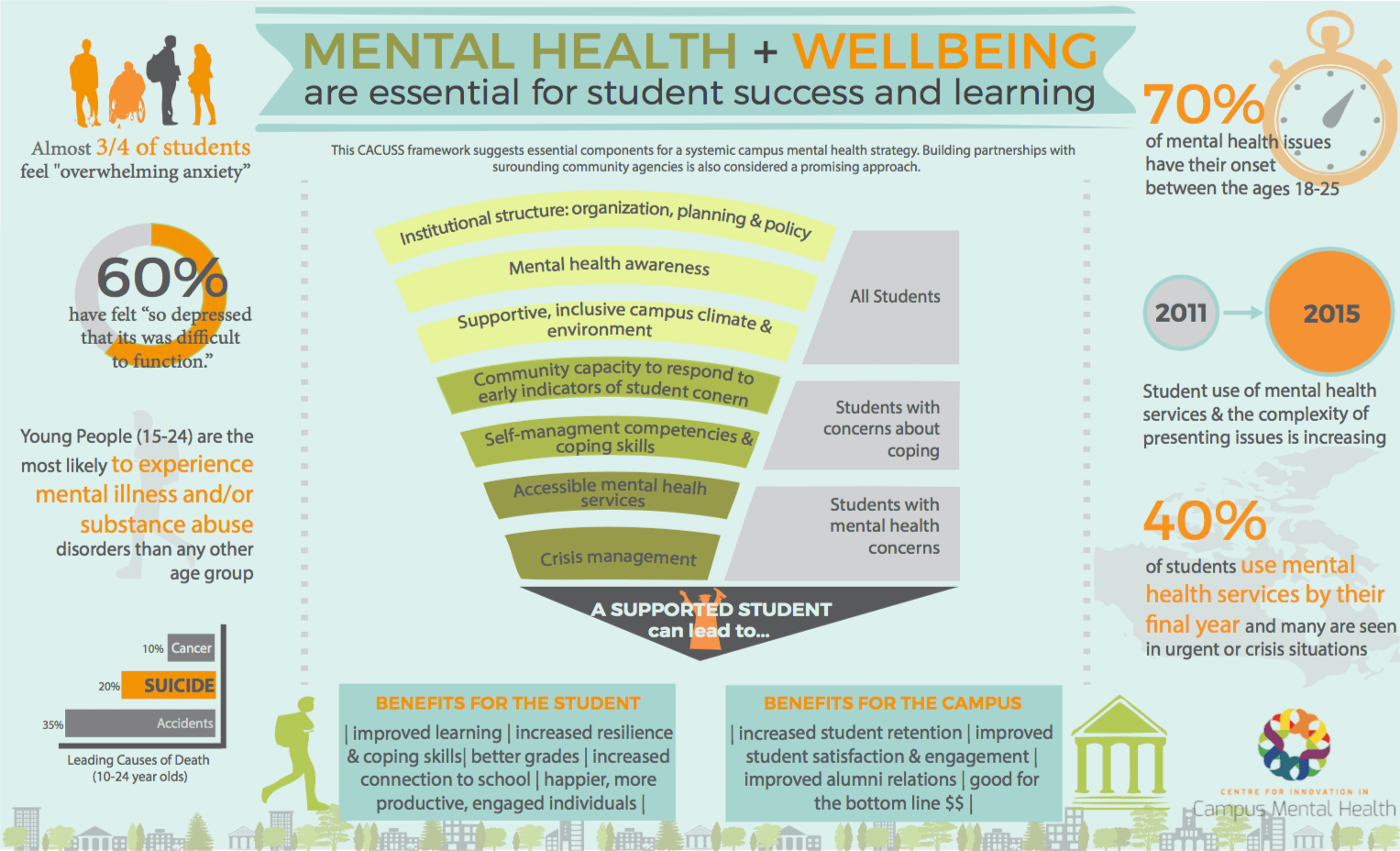Overview
Why did we create a toolkit?
The challenge: How can campus-based service providers best support students who present with complex mental health and/or addiction concerns?
This toolkit is designed to help Ontario’s campus-based service providers enhance capacity to support students with complex mental health needs through the creation of campus-community partnerships and circles of care. This toolkit includes promising practices, resources, forms and templates that will help you develop partnerships and agreements with community-based services, link students to these services and facilitate coordinated care both on-campus and off-campus to effectively support students’ mental health, wellness and learning. Campus-community partnerships and coordinated care are essential to supporting students with complex needs; and using a systemic approach is vital to successfully enhancing both student and campus mental health and wellness.
Key Concepts
- Each postsecondary institution has its own unique strengths, circumstances, resources and needs
- Campuses need to build their capacity to reach out to students to help connect them to appropriate resources and supports
- Developing an evidence-based systemic approach in addressing mental health on campus creates impactful outcomes for student well-being and mental health
- Mental health services are a critical part of a systemic approach to supporting student mental health and need to ensure health equity and culturally competent policies and programs
- Service approaches and partnerships need to be student-centered, recovery and trauma-oriented and grounded in values of informed choice and circle of care
- It is essential for campuses to embrace a collaborative approach towards developing internal (campus-based) and external (campus-community) partnerships for effective and enhanced coordination of services
Key Questions
- What are the systemic models which can help campuses develop a strategy around student mental health?
- How can you establish effective links to resources in the community for students requiring specialized care which are not available within campus mental health services?
- How do you ensure campus mental health services are trauma-informed?
- How can you ensure effective and appropriate referrals and follow up?
- What are some promising practices for campus-community partnerships that exist?
- How do you create safe and inclusive campus environments that are reflective of diversity and promote resilience?
This toolkit is designed to help you answer some of those questions, and provides practical examples and illustrations of ways you can apply the tools in your own setting.
Learning Objectives
This toolkit is designed to help you:
- Learn more about promising practices to support students with complex needs, including: client service models, protocols and documentation, confidentiality and privacy standards
- Review your campus’ internal and external partnerships to effectively support students with complex needs
- Understand the Community Mental Health system and how to initiate partnerships
- Identify gaps and create a campus-community partnership action plan
- Learn about mental health indicators relevant for campus-based mental health services and ways your campus can collect data to help enhance programs, services, and advocate for new resources
- Reflect on your own cultural competency and learn more about training and resources in this area
- Assess your campus services to ensure they are trauma-informed and learn how to create an environment which help all students feel welcome, safe and secure.
Background
A key area of focus for CICMH has been enhancing access to knowledge and expertise around mental health. This toolkit, informed by an inclusive, consultative process, came about as a result of a need voiced by many of our post-secondary mental health providers to have an easy to access centre of information to support their work with students.
As part of this process, CICMH interviewed ten key informants from equally represented colleges and universities across Ontario. The geographic range included northern, eastern, and southwestern Ontario as well as the GTA and surrounding area. The informants provided information and insight based on their past and current work in the field of post-secondary mental health, or through their role(s) that enable access to specialized mental health services.
CICMH also hosted a Round Table discussion with key informants with the intent of developing consensus on promising practises in the area of facilitating enhanced access to specialized expertise. In addition, guidance was provided on recommended actions which the Centre should undertake during the next year.
From these discussions, the Centre identified a set of strategies and actions to assist campus-based front-line service providers in accessing specialized mental health expertise. Thus, began the birth of the Campus-Community Connection Toolkit as a means of providing guidance and highlighting some promising practices being used on a range of campus settings across the province.
Campus-Community Connection
Did You Know?
Students with complex mental health needs are less likely to drop out of school and more likely to do well in school if they are connected to appropriate services and supports.


